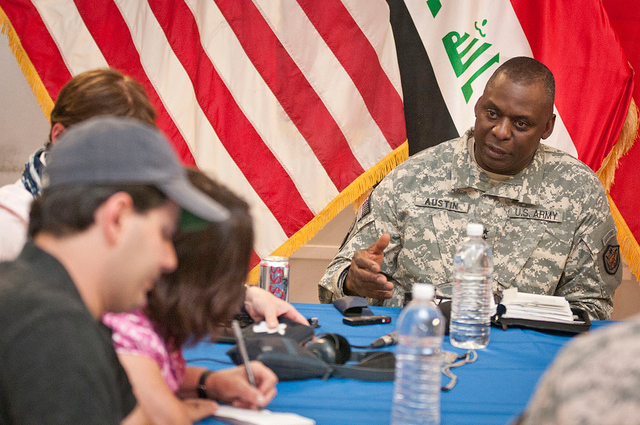
Honest, paywall-free news is rare. Please support our boldly independent journalism with a donation of any size.
The top US commander in the Middle East said Wednesday that a Pentagon program that sought to train and arm 5,400 opposition fighters to confront Islamic State militants in Syria this year has only “four or five” in the field.
Gen. Lloyd Austin III, commander of US Central Command, made the disclosure Wednesday during a heated hearing in the Senate Armed Services Committee, where he was grilled about the $500-million program’s effectiveness.
Under US law, the Pentagon must vet the fighters to ensure they are not extremists. That, combined with logistical and political challenges in the fierce multi-sided war, has led to long delays in the year-old program.
Austin said the first group of 54 fighters were sent into northern Syria in July after a six-week training course. But they were attacked by Al Nusra Front, an Al Qaeda affiliate, and most of the fighters were killed, captured or scattered.
Asked how many remain, he responded, “It’s a small number. … We’re talking four or five.”
“As I see it right now this four or five US trained fighters – let’s not kid ourselves, that’s a joke,” said Sen. Kelly Ayotte (R-N.H.).
Sen. John McCain (R-Ariz.), chairman of the committee, repeatedly accused Austin of projecting a rosier view of the US effort to defeat Islamic State than the facts suggest.
A separate CIA-run program is believed to have armed and fielded a larger force, but little is known about it.
Austin conceded the Pentagon has struggled to train and equip a proxy force, and that the military will fall far short of its goal of training 5,400 rebel fighters a year for the next three years.
“At the pace we’re going, we won’t reach the goal that we had initially established for ourselves,” Austin said.
Four countries – Turkey, Jordan, Saudi Arabia and Qatar – agreed to host the Pentagon training program.
But they sharply disagree with Washington on what the proposed proxy force should do. They want the rebel force to focus first on ousting Syrian President Bashar Assad, while the White House wants the fighters to target Islamic State.
Austin said he could not comment on reports of an internal Pentagon investigation into whether officers under his command had altered military intelligence assessments to make the US campaign against the Islamic State seem more successful.
“Once the investigation is completed, based on the findings, you can be assured that I will take appropriate actions,” he said.
A terrifying moment. We appeal for your support.
In the last weeks, we have witnessed an authoritarian assault on communities in Minnesota and across the nation.
The need for truthful, grassroots reporting is urgent at this cataclysmic historical moment. Yet, Trump-aligned billionaires and other allies have taken over many legacy media outlets — the culmination of a decades-long campaign to place control of the narrative into the hands of the political right.
We refuse to let Trump’s blatant propaganda machine go unchecked. Untethered to corporate ownership or advertisers, Truthout remains fearless in our reporting and our determination to use journalism as a tool for justice.
But we need your help just to fund our basic expenses. Over 80 percent of Truthout’s funding comes from small individual donations from our community of readers, and over a third of our total budget is supported by recurring monthly donors.
Truthout’s fundraiser ended last night, and we fell just short of our goal. But your support still matters immensely. Whether you can make a small monthly donation or a larger one-time gift, Truthout only works with your help.